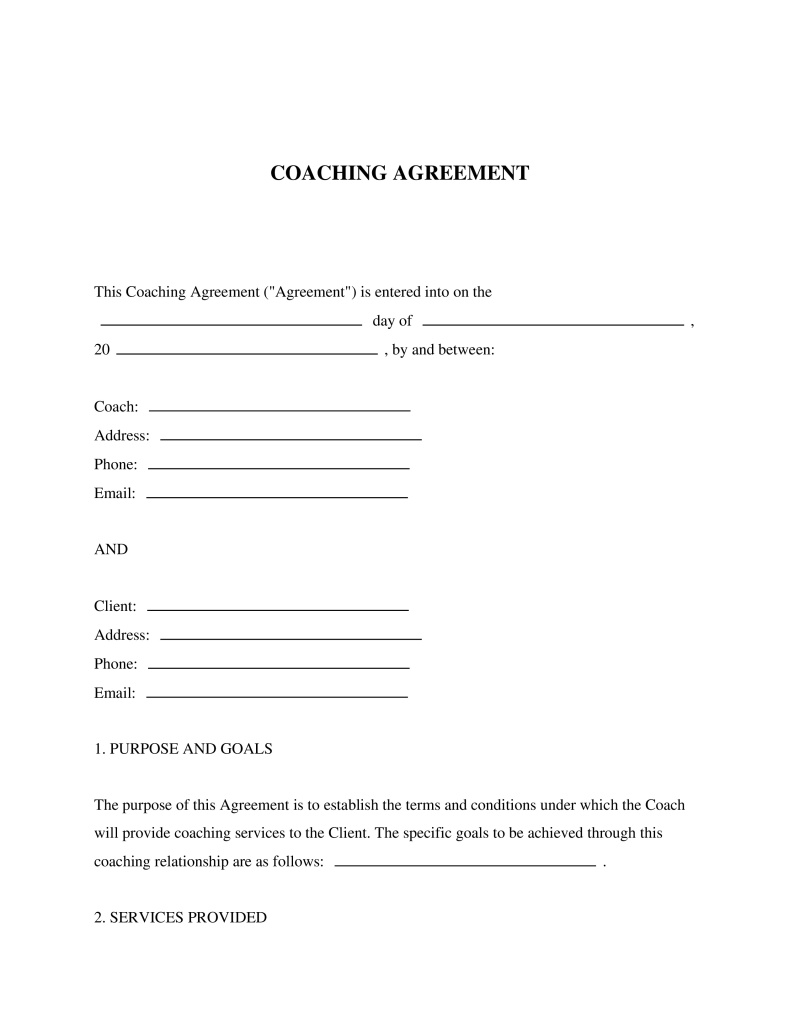A Coaching Agreement is a legal document that outlines the terms and conditions of a coaching relationship.
Coach Name
Write the full name of the coach, including their first, middle (if applicable), and last name. For example, if the coach's name is John Michael Smith, fill in "John Michael Smith." This information is important for identifying the coach in any legal agreements or documents related to their coaching duties.

Table of Contents
What is a Coaching Agreement?
A Coaching Agreement is a legally binding document that outlines the professional relationship between a coach and their client. It serves as a formal agreement, detailing the expectations, scope of services, compensation, confidentiality provisions, and other essential terms and conditions of the coaching relationship. This document is crucial for both parties as it provides a clear framework for the engagement, helping to prevent misunderstandings and setting the stage for a successful partnership. Whether you're an independent coach or part of a larger organization, including nonprofit entities, having a solid Coaching Agreement in place is fundamental. For coaches operating within nonprofit organizations, this agreement ensures that both the coach's and organization's interests are protected, aligning the coaching services with the organization's mission and values.
Key Features
Important Provisions
- Scope of Services: Clearly delineates what coaching services will be provided and any limitations thereof.
- Compensation and Payment Terms: Details fees, payment schedules, refund policies, and any related expenses.
- Confidentiality Agreement: Protects both parties by keeping discussions and shared information private.
- Termination Clause: Specifies conditions under which either party may end the agreement prematurely.
Pros and Cons
Pros
- +Facilitates a clear understanding between coach and client by explicitly stating all terms of engagement.
- +Minimizes potential conflicts by addressing key issues such as confidentiality, payment, and service scope upfront.
- +Enhances professionalism and credibility of the coaching services offered.
- +Provides a legal framework that can be relied upon in case of disputes or misunderstandings.
- +Enables customization to reflect specific needs and preferences of both coach and client.
Cons
- -May require legal consultation to ensure compliance with local laws and regulations, potentially increasing initial costs.
- -Could be perceived as overly formal or intimidating by some clients, possibly affecting relationship-building efforts.
- -Needs regular updates to reflect changes in legal standards or coaching practices.
Common Uses
- Engagements between an individual coach and private clients seeking personal development.
- Contracts with corporate clients for executive coaching or employee development programs.
- Agreements for coaches working within nonprofit organizations to support staff or volunteers.
- Partnerships between educational institutions and coaches for student mentoring programs.
- Collaborations between health professionals and wellness coaches for holistic health plans.
Frequently Asked Questions
Do you have a question about a Coaching Agreement?
Example questions:
Not the form you're looking for?
Try our legal document generator to create a custom document
Community Discussion
Share your experience and help others
Legal Notice: Comments are personal opinions and do not constitute legal advice. Always consult a qualified attorney for matters specific to your situation.
Comments (0)
Leave a Comment
No comments yet. Be the first to comment!